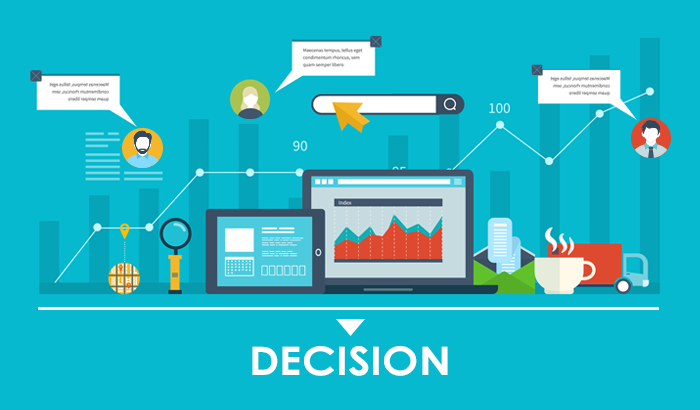Table of Contents
Talking about business trends in 2017, everyone is buzzing about big data, business intelligence, predictive analytics and other big words. So many definitions and technologies we need to keep up with, that it’s easy to get lost in a diversity of interpretations.
Let’s start with business intelligence as a major term we are going to study now.
BI – is a process of data analysis used by enterprises to get the visual information that helps executives, managers, and other users to make the decisions based on business insights.
In plain language, business intelligence is providing decision-makers with crucial information in a comprehensible manner. The concept involves all the processes starting with revealing what kind of data you need, how to collect it, how to use it and how to keep it. The data has to be meaningful, usable and available so you can refer to it in the future.
Business Intelligence and Data Analytics – what’s the difference?
Business intelligence term has been brought into widespread usage in 1989 by Howard Dresner. He introduced BI as a combination of concepts and methods, that improved the decision-making in business, due to the usage of fact-based support systems.
Advanced data analytics is a more broad category and includes machine learning, predictive analytics, big data analytics, data mining etc.
To make it more comprehensible, we gathered general features of both business intelligence and advanced analytics into the following chart:
As you can see, business intelligence is the preliminary step to advanced analytics.
Business intelligence tools – definition and purpose
Business intelligence tools are generally standalone software tools tailored to a specific industry needs. BI tools are made to retrieve, analyze and report data that is used for further decision making. That means you need to have the data to be analyzed and tuned into insightful and actionable business information. It might be stored in a data warehouse, data mart or in the cloud.
Why do you need special BI tools?
Since any company goal is to become the first and the best in its business sector, corporate executives, business managers, and any other operational workers feel the huge pressure when making business decisions. They need to analyze massive amounts of materials to make the most informed and worthwhile decisions. Therefore, implementing BI tools into general business processes is not a whim anymore, but a must-have.
Below are the main advantages of using business intelligence tools:
- Optimization of internal business processes
- Increasing business efficiency
- Boosting business performance
- Determine the market trends and insights
- Spotting business problems and needs
- Acceleration and improvement of decision making
- Increasing company revenues
- Data mining in IoT systems
Types of business intelligence tools
Now that business intelligence is able to solve multiple business problems and propose various solutions, BI tools can be roughly divided into three categories:
Reporting BI tools. Managing a huge corporation requires ongoing reporting processes so that executives could observe the state of things. But very often these reports look like a huge and obscure spreadsheet with lots of tabs and charts that no one can explain or understand how to use this information.
Meanwhile, reporting business intelligence software generates human-readable reports and can use data from various sources like social media channels, emails, different company departments and external systems.
Reports are delivered in an electronic format and can be used for financial planning, budgeting and performance management processes.
Querying tools usually run widely used queries and self-service reports giving businesses simple answers. The data analysis is provided to a certain level and can be customized so that the data is filtered, sorted and formatted.
Advances tools allowing to dive deeper into the data analysis due to the usage of such approaches as predictive analytics.
The common point of all the business analytics tools is giving final users the possibility to access the needed information like business procedures, performance, market trends and other data. Moreover, both companies and BI tools vendors need to provide the storage that would be enough to place and hold all the data. For example, AWS is offering the cloud-based storage for big data, so you don’t need to proceed any hardware in-house or maintain any infrastructure on your own.
Business niches that need business intelligence above all:
Though business intelligence can be applied in any business, here is the list of niches, where companies desperately need deep analysis to stay competitive:
- Banking industry
- Retail
- Financial sector
These enterprises are looking for insights into customer behavior, trends, and possible ways of raising their position on the market.
Who are the primary users of business intelligence analytics tools? Generally, the final users of BI tools are upper management such as CMO, CFO, and CEO. Business analytics gather all the needed data and pass it to department’s chief so that they can understand how the company’s strategy affects incomes and why, and what are the results or the competitors. Those reports allow to identify the problems as well as find the new markets, tactics or sales opportunities.
According to the latest studies by McKinsey found that decisions based on data-driven insights result in 23 times greater likelihood of customer acquisition, 6 times greater likelihood of customer retention and 19 times greater likelihood of profitability.
Conclusion
Today, the question is not whether your company needs a BI analytics tool, it transformed in “What BI tool does your company require?”. Nevertheless, this strategic decision must be based on your business needs and capabilities. In order to choose the most suitable one, provide the deep assessment and comparison of available products to decide if they fit your needs and posses the potential for further technologies support. Anyway, if you don’t find the perfect match for your company, we can develop it for you from scratch.





